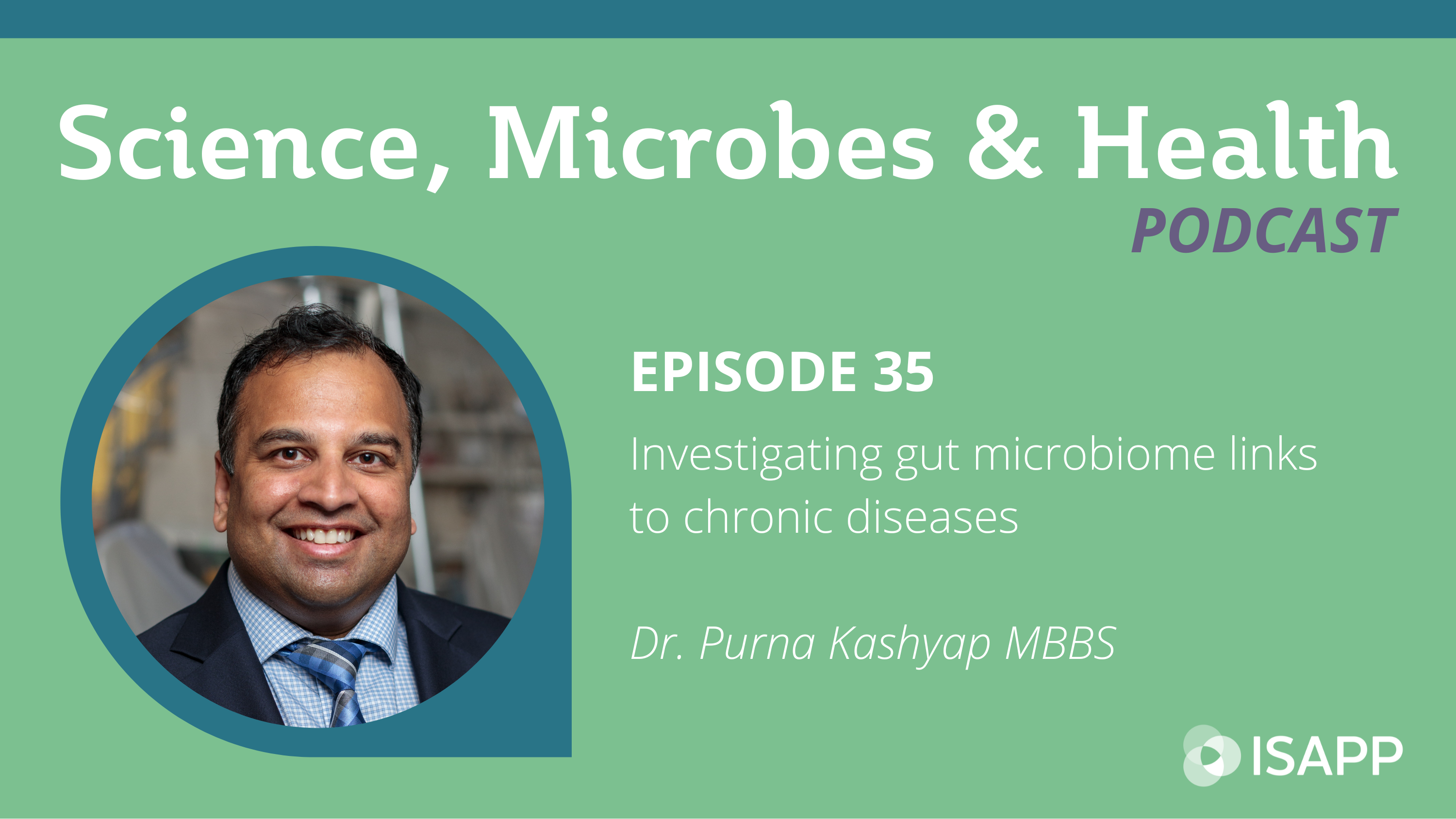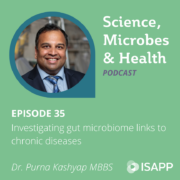Episode 35: Investigating gut microbiome links to chronic diseases, with Dr. Purna Kashyap MBBS

Podcast: Play in new window | Download
Subscribe: Apple Podcasts | Spotify | RSS
In this episode, the ISAPP hosts discuss the gut microbiome’s role in chronic diseases with Dr. Purna Kashyap MBBS, from Mayo Clinic in Rochester, Minnesota, USA. Dr. Kashyap talks about how to discover the complex factors that trigger and perpetuate chronic diseases such as inflammatory bowel disease, zeroing in on the gut microbiome as a contributor to different aspects of gastrointestinal (GI) tract physiology.
Key topics from this episode:
- Dr. Kashyap became interested in some of the initial studies linking the gut microbiome to chronic diseases around 2007-2008, and subsequently began to study the molecular mechanisms that underlie changes in GI tract physiology.
- How can scientists figure out causality in chronic diseases and the role of gut microbes? Dr. Kashyap sees causality as an ongoing cascade of events in the GI tract, with no single causal factor. Both the initial triggers and the perpetuating factors can be considered part of what causes these diseases.
- Microbes can help perpetuate a certain state in the host because once they establish themselves they serve to make the environment more conducive to their survival. In chronic diseases, the factor that triggers the microbial community configuration may not be as important as the factor(s) that perpetuate it on an ongoing basis.
- The gut microbiome is changeable but not easy to change. Scientists need to know how the microbial community sustains itself and intervene there to change the community.
- Even small microbiome studies can be informative if you look at who responds to the intervention and why. This information can be valuable for informing which treatments might work for which subgroups of people.
- Dr. Kashyap encourages combining three types of research: large-scale studies on microbial metabolites and potential drug targets; clinical studies on the metabolites present in various subgroups; preclinical models studying the effects of individual metabolites.
- Diet, microbes, and host uptake all contribute to the physiological effects of different metabolites. And for example, if a metabolite is low, knowing which microbes are present is not enough information to explain why it’s low.
- In gastroenterology, clinicians primarily care about the gut microbiome in relation to the new treatments it makes possible. Now that FDA-approved treatments exist (standardized fecal microbiota transplants for recurrent C. difficile), clinicians may start paying more attention.
- Does Dr. Kashyap recommend interventions to patients based on their gut microbiomes? A high-fiber diet is good for the gut microbiome and also for overall health, so he advises patients to adhere to dietary recommendations for their daily fiber intake.
Episode abbreviations and links:
- Article on the microbiome in irritable bowel syndrome: Multi-omics for biomarker approaches in the diagnostic evaluation and management of abdominal pain and irritable bowel syndrome: what lies ahead
- Study comparing the effects of gut microbiota from people in the US vs. rural Thailand: Industrialized human gut microbiota increases CD8+ T cells and mucus thickness in humanized mouse gut
- Study on the effects of the metabolite tryptamine: Gut Microbiota-Produced Tryptamine Activates an Epithelial G-Protein-Coupled Receptor to Increase Colonic Secretion
- GWAS: Genome-wide association studies
Additional resources:
Why researchers need to understand more about the small intestinal microbiome. ISAPP blog.
About Dr. Purna Kashyap:
Dr. Purna Kashyap is practicing gastroenterologist and Professor of Medicine and Physiology, the Bernard and Edith Waterman Director of the Microbiome program, and Director of the germ-free mouse facility in the Center for Individualized Medicine at Mayo Clinic, Rochester, MN. The NIH funded Gut Microbiome laboratory led by Dr. Kashyap is focused on delineating the complex interactions between diet, gut microbiome, and host gastrointestinal physiology. The laboratory uses germ-free mouse models in conjunction with measures of gastrointestinal physiology in vitro and in vivo to investigate effects of gut microbial products on host gastrointestinal function. In parallel, they use a systems approach incorporating multi-omics, patient metadata, and physiologic tissue responses in human studies, to aid in discovery of novel microbial drivers of disease. The overall goal of the program is to develop novel microbiota-targeted therapies. Dr. Kashyap has published nearly 100 peer reviewed articles including journals like Cell, Cell Host Microbe, Science Translational Medicine, Nature Communications, and Gastroenterology. He was inducted to American Society of Clinical Investigation in 2021. He has previously served on the scientific advisory board of American Gastroenterology Association Gut Microbiome Center, and on the council of American Neurogastroenterology and Motility Society. He now serves on the council and the research committee of AGA, in an editorial role for Gut Microbes and as an ad hoc reviewer on NIH study sections.





